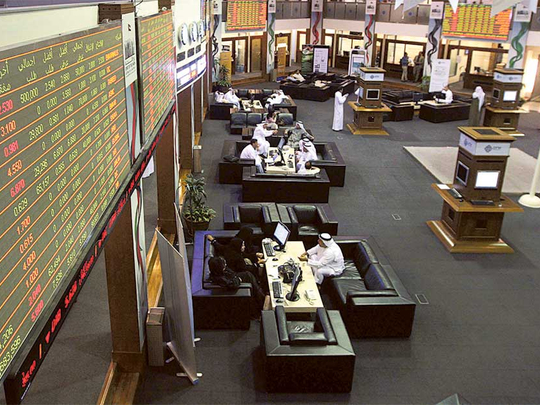
Dubai: The UAE markets stabilised on Wednesday after sharp cuts in the previous few sessions on hopes that the country will continue to deliver on budget surpluses despite falling crude oil prices.
The Dubai Financial Market General Index ended 1.64 per cent lower at 3,033, after the index shed more than 7 per cent in the three out of four previous sessions, when falling crude prices dented investor sentiment.
Crude oil slumped about 45 per cent this year as the Organisation of Petroleum Exporting Countries sought to defend market share amid a US shale boom.
“We are beginning to see the first signs of stability though there might be some volaitilty. This stability is coming through due to comments made by senior government officials,” Saleem Khokhar, head of equities at National Bnak of Abu Dhabi’s asset management group said on phone from London.
On Tuesday, the UAE’s minister of economy Sultan Bin Saeed Al Mansouri said he is confident that the country will deliver budget surpluses despite plunging crude oil prices.
In stock specific movements, Emaar Properties, which has the highest weightage on the DFM index, ended 3.59 per cent lower at Dh5.90, after hitting the lower circuit on Tuesday.
Arabtec, another property developer, ended 9.77 per cent lower at Dh2.40. Dubai Islamic Bank, which was one of the stock that ended up among the other 11 scrips, ended 1.98 per cent to be at Dh5.15.
The Abu Dhabi Securities Exchange General Index ended 5.11 per cent higher at 4,090.99, making it the biggest gainer in the GCC region.
Elsewhere, Saudi’s Tadawul All Share index (Tasi) ended 4.21 per cent at 7,638.90. The Muscat Securities MSM 30 Index closed 1.35 per cent higher. The Kuwait Stock Exchange end 0.90 per cent lower., while the Qatar Exchange Index ended 1.12 per cent higher at 11,181.65.
Investors would also eye the Federal Reserve meeting in the United States.
Federal Reserve officials in Washington are likely to focus on a jobless rate that’s fast approaching their goal for full employment, even as declining oil prices hold inflation below their targets.
Recovery
“We would start to stabilise, and I see potential for recovery in asset prices in 2015,” said Khokhar.
Dubai index was the best performing market in the GCC region until early December.
“This recovery would be based on the realisation that underlying health of the real economy remains strong and earnings of our companies to be reboust,” said Khokhar.
Dubai’s GDP is projected to grow at 4.5 per in 2015, after it grew at 4.6 per cent in 2013, 4 per cent in 2014 and
Trade, real estate services and manufacturing are expected to be the largest contributors to growth (58 per cent) in 2015.












